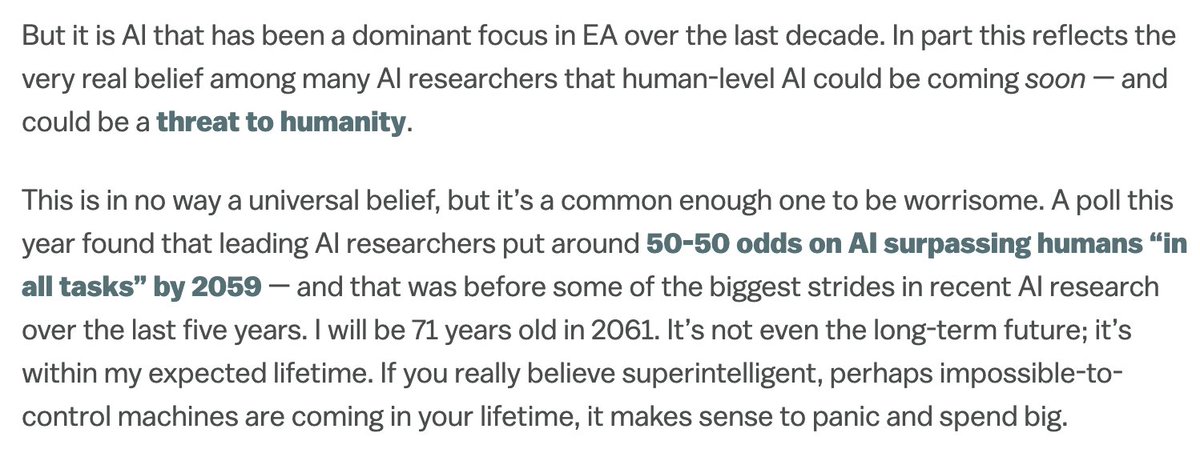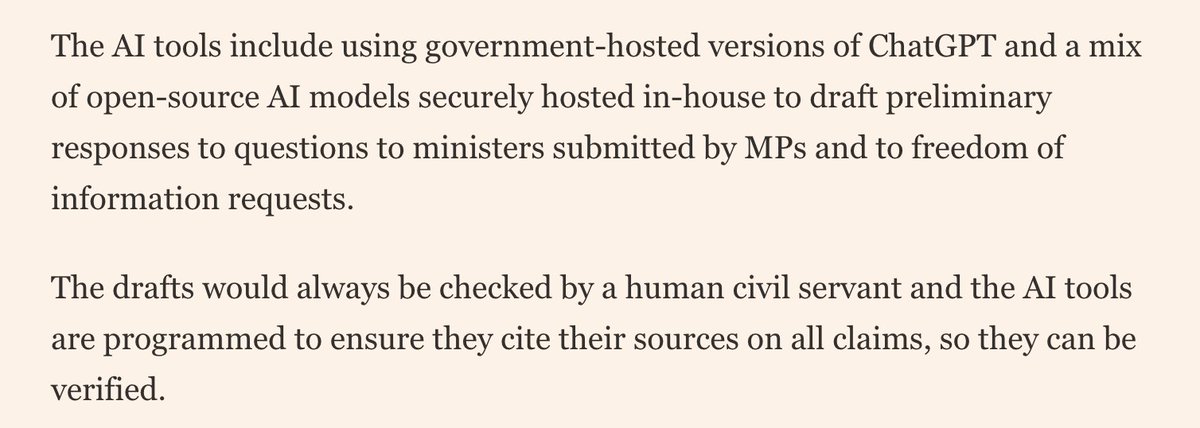Read the recent Vox article about effective altruism ("EA") and longtermism and I'm once again struck by how *obvious* it is that these folks are utterly failing at ceding any power & how completely mismatched "optimization" is from the goals of doing actual good in the world.
>>
>>
https://twitter.com/emilymbender/status/1520576657785991169
Just a few random excerpts, because it was so painful to read...
>>
>>
"Oh noes! We have too much money, and not enough actual need in today's world."
First: This is such an obvious way in which insisting on only funding the MOST effective things is going to fail. (Assuming that is even knowable.)
>>
First: This is such an obvious way in which insisting on only funding the MOST effective things is going to fail. (Assuming that is even knowable.)
>>

Second: Your favorite charity is now fully funded? Good. Find another one. Or stop looking for tax loopholes.
>>
>>
Third: Given everything that's known about the individual and societal harms of income inequality, how does that not seem to come up?
My guess: These folks feel like they somehow earned their position & the burden of having to give their $$ away.
>>
My guess: These folks feel like they somehow earned their position & the burden of having to give their $$ away.
>>
Another consequence of taking "optimization" in this space to its absurd conclusion: Don't bother helping people closer to home (AND BUILDING COMMUNITY) because there are needier people we have to go be saviors for.
>>
>>

Poor in the US/UK/Europe? Directly harmed by the systems making our homegrown billionaires so wealthy? You're SOL, because they have a "moral obligation" to use the money they amassed exploiting you to go help someone else.
>>
>>
"Oh noes! The movement is now dominated by a few wealthy individuals, and so the amount of 'good' we can do is depending on what the stock market does to their fortunes.
>>
>>

And yet *still* they don't seem to notice that massive income inequality/the fact that our system gives rise to billionaires is a fundamental problem worth any attention.
>>
>>
Once again: If the do-gooders aren't interested in shifting power, no matter how sincere their desire to go good, it's not going to work out well.
>>
>>
And that's before we even get into the absolute absurdity that is "longtermism". This intro nicely captures the way in which it is self-congratulatory and self-absorbed:
>>
>>

"Figuring out which charitable donations addressing actual real-world current problems are "most" effective is just too easy. Look at us, we're "solving" the "hard" problem of maximizing utility into the far future!! We are surely the smartest, bestest people."
>>
>>
And then of course there's the gambit of spending lots of money on AI development to ... wait for it ... prevent the development of malevolent AI.
>>
>>

To his credit, the journalist does point out that this is kinda sus, but then he also hops right in with some #AIhype:
>>
>>

Yes, we are seeing lots of applications of pattern matching of big data, and yes we are seeing lots of flashy demos, and yes the "AI" conferences are buried under deluges of submissions and yes arXiv is amassing ever greater piles of preprints.
>>
>>
But none of that credibly indicates any actual progress towards the feared? coveted? early anticipated? "AGI". One thing is does clearly indicate is massive over-investment in this area.
>>
>>
If folks with $$ they feel obligated to give to others to mitigate harm in the world were actually concerned with what the journalist aptly calls "the damage that even dumb AI systems can do", there are lots of great orgs doing that work who could use the funding:
>>
>>
I'm talking about organizations like @AJLUnited @C2i2_UCLA @Data4BlackLives and @DAIRInstitute and the scholarship and activism of people like @jovialjoy @safiyanoble @ruha9 @YESHICAN and @timnitGebru
>>
>>
... I'm sure there's more to say and I haven't even looked at the EA puff piece in Time, but I've got other work to do today, so ending here for now.
• • •
Missing some Tweet in this thread? You can try to
force a refresh







